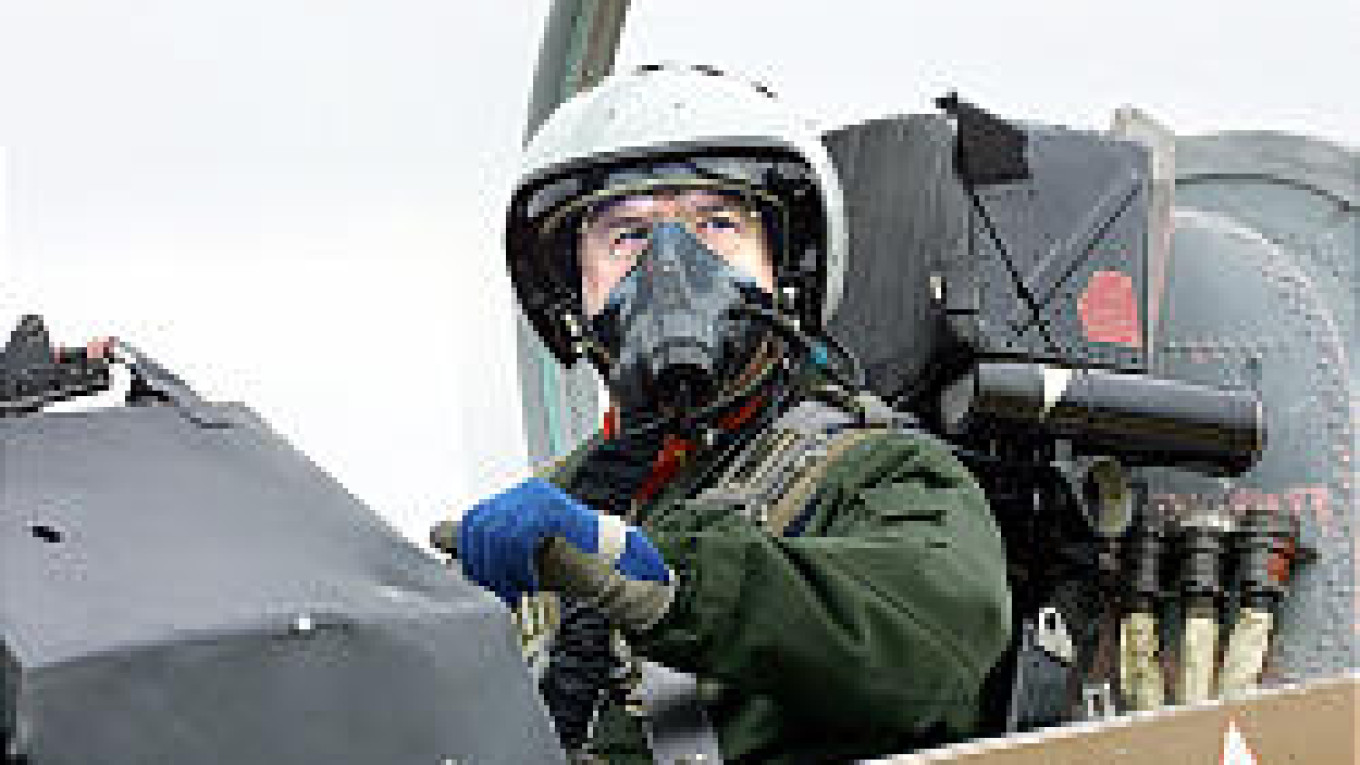"The French engine and the Russian frame go very well together," General Job said Friday after his first ride on the MiG-AT, a joint project between Russian Aircraft Corp. MiG and France's Thales Avionics and engine maker Snecma. "I was impressed by the quality of the craft's performance, it is very easy to pilot."
Job said at the demonstration that the MiG-AT symbolizes an important step in relations between the two countries, which fought side by side in World War II and have since cooperated in the aircraft industry.
Russia and France began cooperation on the craft in 1997. The two existing MiG-AT prototypes, built at MiG's production facility in Moscow, are powered by two Snecma Larzac 04R20 engines. The craft that Job flew also uses Thales' Topflight avionics system, while the other prototype uses Russian avionics.
The MiG-AT was first designed in the early 1990s to replace the Russian air force's vast fleet of Czech-made L-29 and L-39 trainer jets. The craft first flew in 1996, as did its main competitor, the Yak-130.
So far, the MiG-AT's two prototypes have flown 750 flights, said the plane's chief designer, Vasily Shtykalo. The trainer is now going through a program of official tests, and it is expected to be certified for use by the air force in 2003. MiG has big plans for selling the jet abroad, but the craft must be accepted by the Russian air force before foreign countries would even consider buying it.
MiG-AT was at the center of controversy last month when the air force chose Yakovlev's Yak-130 in a tender for a new trainer jet. The air force said the Yak-130 is superior because it combines the features of a trainer and a combat jet, allowing for its use in conflicts.
Until recently, Yakovlev had cooperated with Italy's Aermacchi in building the Yak-130. Aermacchi, however, is pursuing its own M346 trainer project, which is based on the Yak-130.
Commander in chief Vladimir Mikhailov confirmed Friday that the air force will split the contract between the two trainers. "We will use both the Yak-130 and MiG-AT when they are built," Mikhailov told reporters, declining to give the number of jets required by the air force.
Yakovlev is currently focusing its efforts on building its first prototype at its Sokol plant in Nizhny Novgorod. The company plans to deliver four Yak-130s next year, after which it will begin 18 months of official testing.
Both companies are estimating that the Russian air force will need hundreds of trainer jets after the Czech planes are decommissioned, although the air force itself has said that no new planes will be bought before 2005.
Though touting their jets for Russian student pilots is a priority for both MiG and Yakovlev, tapping foreign markets is of equal importance. MiG sees the French contribution to the MiG-AT as serious leverage in negotiations.
MiG acknowledges that its trainer will face fierce competition in the years to come from other foreign trainers, but the company is confident of its niche in the market.
"The star hour for the MiG-AT could be the period from now until 2008," said Igor Amosov, executive secretary of the Russian-French MiG-AT coordination council.
MiG will be competing with Britain's BAE Systems Hawk trainer; the L-159 advanced light combat aircraft, developed jointly by the Czech Republic and U.S. Boeing; Italy's Aermacchi M346; European EADS's Mako; and U.S. Lockheed Martin's T-50.
MiG hopes to sell its trainer to poorer countries. Amosov said the MiG-AT costs half as much as Britain's Hawk, which retails for around $20 million. Both jets are competing for an Indian order of some 60 trainer jets.
Another advantage lies in safety, with the MiG-AT having two engines, while its competitors have just one, Amosov said. Also, Snecma and Thales have a widespread network of servicing centers should the craft need repairs.
Russia and France should be able to sell as many as 400 MiG-ATs before 2010, Amosov said, and MiG's own proceeds from these sales could amount to as much as $3 billion. MiG also has some 12 other jets in various stages of assembly, he added.
Asked whether France will sign the aircraft for its own air force, Job said that it was too early to say. He said France needs to replace its German/French Alfa-Jet trainers, but plans to fly them until at least 2012.
A Message from The Moscow Times:
Dear readers,
We are facing unprecedented challenges. Russia's Prosecutor General's Office has designated The Moscow Times as an "undesirable" organization, criminalizing our work and putting our staff at risk of prosecution. This follows our earlier unjust labeling as a "foreign agent."
These actions are direct attempts to silence independent journalism in Russia. The authorities claim our work "discredits the decisions of the Russian leadership." We see things differently: we strive to provide accurate, unbiased reporting on Russia.
We, the journalists of The Moscow Times, refuse to be silenced. But to continue our work, we need your help.
Your support, no matter how small, makes a world of difference. If you can, please support us monthly starting from just $2. It's quick to set up, and every contribution makes a significant impact.
By supporting The Moscow Times, you're defending open, independent journalism in the face of repression. Thank you for standing with us.
Remind me later.


